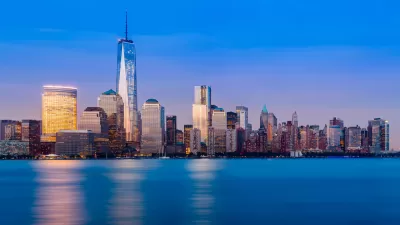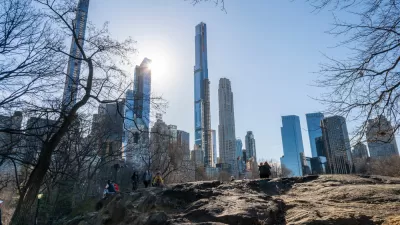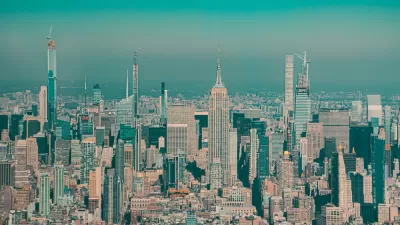The Washington Post performs a sort of reverse archaeology: looking skyward to the heights of building for a record of the country's economic fortunes.
Emily Badger examines the influence of economics on city skylines, or "how construction costs and condo prices shape the skyline, how building booms chase business cycles, why new record-breaking towers reach the heights they do."
Badger is sharing the work of Jason Barr, an economist and author who calls his area of study "skynomics." Barr's new book, Building the Skyline: The birth and growth of Manhattan's skyscrapers, and the article focus specifically on New York City. Depending on the era, according to the timeline laid out in this article, the economy pushed the development of skyscrapers for different reasons. One pattern Barr has noticed shared by those eras: "Periods of extreme income inequality in the U.S. have occurred alongside the growth of New York's skyline."
FULL STORY: How skyscrapers reveal the rise and fall of American fortunes

Maui's Vacation Rental Debate Turns Ugly
Verbal attacks, misinformation campaigns and fistfights plague a high-stakes debate to convert thousands of vacation rentals into long-term housing.

Planetizen Federal Action Tracker
A weekly monitor of how Trump’s orders and actions are impacting planners and planning in America.

In Urban Planning, AI Prompting Could be the New Design Thinking
Creativity has long been key to great urban design. What if we see AI as our new creative partner?

King County Supportive Housing Program Offers Hope for Unhoused Residents
The county is taking a ‘Housing First’ approach that prioritizes getting people into housing, then offering wraparound supportive services.

Researchers Use AI to Get Clearer Picture of US Housing
Analysts are using artificial intelligence to supercharge their research by allowing them to comb through data faster. Though these AI tools can be error prone, they save time and housing researchers are optimistic about the future.

Making Shared Micromobility More Inclusive
Cities and shared mobility system operators can do more to include people with disabilities in planning and operations, per a new report.
Urban Design for Planners 1: Software Tools
This six-course series explores essential urban design concepts using open source software and equips planners with the tools they need to participate fully in the urban design process.
Planning for Universal Design
Learn the tools for implementing Universal Design in planning regulations.
planning NEXT
Appalachian Highlands Housing Partners
Mpact (founded as Rail~Volution)
City of Camden Redevelopment Agency
City of Astoria
City of Portland
City of Laramie





























